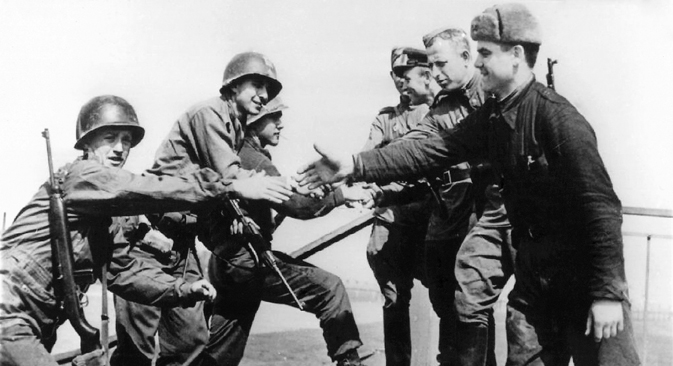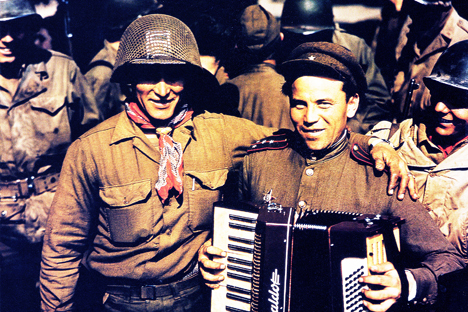70 years after the link-up at the Elbe River, Russia and U.S. should start dialogue

American (left) and Russian soldiers shake hands on April 24, 1945 at the destroyed bridge over river Elbe as both troops meet at Torgau, Germany. Source: DPA/AFP/East-News
A group picture depicting soldiers, lining up in a row, posing before the camera and embracing each other, appeared on the screen in a conference hall: Those in the helmets were the Americans, while the men in field caps were the Soviets. The place where they came together on April 25, 1945, is called Torgau, and sits on the Elbe River in Germany.
While presenting this picture, Director of Carnegie Moscow Center Dmitry Trenin highlighted that the 70th anniversary of the historic meeting between Soviet and American allies in the war against Nazi Germany is a very important event in the context of the current U.S.-Russia confrontation over Ukraine, which some pundits are describing as “a new Cold War.”
“Today’s meeting is very important and, maybe more important than earlier, because the celebration of the 70th anniversary of the Great Victory is taking place,” he said during the April 23 conference, which brought together Russian and American high-profile officials, experts, retired militaries and diplomats such as U.S. Ambassador to Moscow John Tefft, former U.S. Ambassador and Director of U.S.-Russia Foundation John Beyrle.
“This is also very important because we are seeing a severe crisis between the U.S. and Russia, which has already thrown back our relations to the level of national and rhetorical hostility that was common in the Cold War,” Trenin added.
He pointed out that the current U.S.-Russia confrontation might be “even more dangerous” than that of the Cold War period because of the increasing unpredictability of both sides’ intentions, as well as the prevailing opinions in some expert circles that Moscow and Washington “are doomed” to be at loggerheads, which “is alarming.”
Current relations cause for alarm
Likewise, other speakers are alarmed by the current situation. Russian federal politician and former Human Rights Ombudsman Vladimir Lukin, who took the floor at the conference, expressed the same regrets, but focused more “the positive spirit” of the link-up between Soviet and American soldiers. According to him, such events are emotionally encouraging in their nature, they “have a sort of positive and emotional effect on our souls,” which can help to maintain a positive spirit even in the most difficult times, when there is a lack of understanding between countries.
“Somehow, this helps us to preserve a positive and emotional spirit, which allows us, if not to resolve problems, but to postpone them in the hope of resolving them in the future,” he said.
Another venerable speaker at the conference, U.S. Ambassador Tefft, echoes Lukin’s view.
“The spirit of Torgau is a reminder for all of us of mutual hopes in the midst of grim realities,” he said, remembering how the Soviet and American soldiers shared souvenir dollars and rubles, “smoked cigarettes together and toasted one another with liberated beer.”
With tensions high between the White House and the Kremlin on a number of issues, “it is really valuable to discuss the legacy of Torgau,” because it has “tremendous lasting and symbolic importance,” he said. Regardless of the different political and economic systems of the U.S. and the Soviet Union, “we were still able to collaborate in those years to achieve a greater good, to defeat Nazi Germany,” Tefft added.
A shining example
Former U.S. Ambassador John Beyrle, whose father Joseph Beyrle fought together with the Red Army against Hitler, agrees. He describes the joint efforts in the war against Hitler as a “great collaboration” that endured all the tests and challenges of that time, when the Allies had to find common ground despite mutual tensions.
The story of Beyrle’s father offers encouragement for U.S.-Russia bilateral relations. After being captured by German forces and spending about six months in Nazi prison camps, he fled three times from captivity, finally finding shelter in a Soviet tank army.
“Thank you to those Soviet warriors, men and women, who hosted my father when he was defenseless, who fed him when he was hungry, who treated him when he was seriously wounded and helped him reach the U.S. Embassy and return to his home country safe and sound,” said Beyrle in Russian.
In particular, he emphasized that few in the U.S. are aware about the exact number of victims among Soviets and Americans during World War II. Likewise, many in Russia underestimate or are even unaware of the 1941-1945 Lend-Lease program, under which the U.S. provided the UK and the Soviet Union with food, oil, provision, vehicles and materials to help them in the fight against Nazi Germany.
What lessons should Russia and the U.S. learn from World War II? Does the lack of knowledge about Soviet-American cooperation threaten the future relations? Read the full story at Russia Direct.
Russia Direct is an international analytical media outlet with the focus on foreign policy. Its premium services, such as monthly analytical memos and quarterly white papers, are free but available for subscribers only. For more information about the subscription, please visit russia-direct.org/subscribe.
All rights reserved by Rossiyskaya Gazeta.
Subscribe
to our newsletter!
Get the week's best stories straight to your inbox
